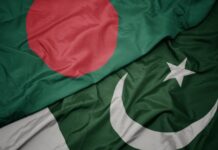In a recent television interview, Pakistan’s Prime Minister Imran Khan revealed that his government was in the process of negotiating with the Tehreek-e-Taliban Pakistan (TTP), a banned terrorist group credited with hundreds of terror attacks in Pakistan, killing thousands of Pakistani soldiers and civilians. According to government’s own estimates, more than 80,000 people have been killed in the last two decades due to terrorism, mainly carried out by the TTP.
“We are in talks with some of the groups on a reconciliation process,” he said in the interview, given to a Turkish news channel. “There are different groups which form the TTP and some of them want to talk to our government for peace,” the PM further added.
The PM said he is expecting a deal to come out of the talks but again nothing is certain. He also pointed out that he sees dialogue as the only solution and that the government will “forgive” the militants if an agreement is reached.
Pakistan made such peace deals with militants in the past too but they all led to the violent groups being strengthened and challenging the writ of the government even more.
Major peace agreements in the past include the Shakai Agreement in 2004, Sararogha Agreement in 2005, Miranshah Agreement in 2006 and the Swat Peace Agreement in 2009.
This latest revelation by PM Khan has left many baffled and enraged within and outside Pakistan, especially those among the Pashtun ethnic community, who have been directly affected by the bloodshed unleashed by the Pakistani Taliban since 9/11 when such terrorists were allowed to settle in the Pakistani tribal belt and adjacent areas by General Pervez Musharraf, the military dictator ruling Pakistan until the year 2008.
Pakistan appears to have a terrible track record of offering peace deals to various terrorist groups. Even now, when the world seems to be questioning the Afghan Taliban and their occupation of Afghanistan, Islamabad has taken it upon itself to campaign for the hardline Islamist group and has been asking the world to accept their occupation as a legitimate takeover.
Although the Afghan and the Pakistani Taliban have different objectives, much of their ideology overlaps and they usually coexist in the same geographical space, and often provide help to each other. There are media reports that the Afghan Taliban are also involved in the negotiations between the TTP and the Pakistani government, but nothing has been officially confirmed.
Pakistan is also known to host Kashmiri and anti-India militant groups like Lashkar-e-Taiba and Jaish-e-Mohammad, which continue to operate freely in Pakistan, by running religious schools and mosques across the country.
The state, mainly the Pakistani military, has also been promoting Sunni extremist and terror groups like Sipah e Sahaba (now known as Ahl e Sunnat Wal Jamat – ASWJ) to counter ethno-nationalism in Balochistan, and Tehreek Labbaik Pakistan (TLP) to divide the vote of the mainstream political parties.
And while Khan’s government is keen to appease the Pakistani Taliban, the group have denied having such talks and called on its fighters to continue their attacks.
“Tehreek-e-Taliban Pakistan has never announced a ceasefire. The TTP fighters should continue their attacks wherever they are,” TTP spokesperson Muhammad Khurasani said in a statement, released following Khan’s revelations. The group’s attacks have also seen an upsurge in the recent year, with reports emerging that they have once again started to regroup in the Pakistani tribal belt.
